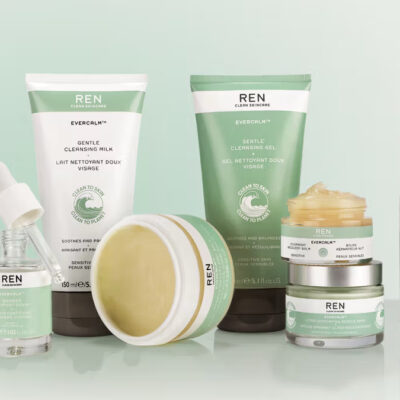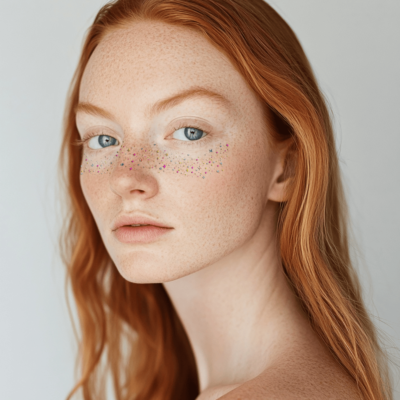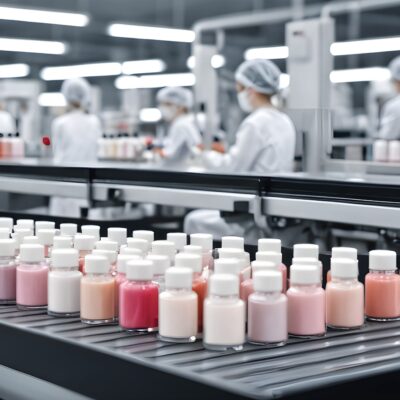
What Beauty Entrepreneurs Who Are Breast Cancer Survivors Really Think About Companies’ Breast Cancer Awareness Month Efforts
At the start of this month, which is Breast Cancer Awareness Month, Cynthia Besteman, founder of the skincare brand Violets Are Blue and a breast cancer survivor, wrote in an Instagram post, “We sit back and watch multi-million and billion dollar companies play on our compassion and trick us into thinking we are doing something good by buying that pink razor, or garbage can, or bottle of toxic laundry detergent…
…What we need is not awareness, what we need is a cure. What we need are resources for underserved communities, what we need are new treatment options, longer lasting treatment options, new technologies, new ideas. Our doctors are doing the best they can with what they have. Finding new treatments takes time and money.”
We were curious if other beauty and wellness entrepreneurs agreed with Besteman’s assessment of Breast Cancer Awareness Month and companies’ involvement in it. So, for the latest edition of our ongoing series posing questions relevant to indie beauty, we asked 10 of them the following questions: Thirty-seven years into Breast Cancer Awareness Month, what’s your take on companies’ efforts during it? How should those efforts change, and what should the beauty industry do to make those changes happen?
- Kelsey Bucci Founder, Paris Laundry
As a young breast cancer survivor, diagnosed at 30 years old, October can be a triggering month. The commercialization of Breast Cancer Awareness Month tends to overshadow the hardships that fighters, survivors and their families have gone through. The endless pink ribbons and other pink merchandise begs the question, “Where is the money going?”
Many corporate sponsors have already decided on a donation amount regardless of how many products are sold throughout the month, so the money is not going to research or care, but rather right back to these companies. Don’t get me wrong, I am grateful for the awareness, but we need action! We need transparency from companies on where the money is going. Are those organizations putting the money towards research or the betterment of patients?
Breast Cancer Awareness month should also be a time to have the tough conversations about what we can do to prevent the disease, lifestyle changes, advocacy and support. I feel like that is possible by not letting the commercial industry obscure the meaning of the month because breast cancer is so much more than one month out of the year.
- Meryl Marshall President and Chief Product Officer, Hynt Beauty
As a 17-year breast cancer survivor, I find myself in a quandary. Breast Cancer Awareness Month should be all about awareness to self-check, get annual mammograms, follow a healthy lifestyle and diet as well as address any health issues immediately. Ignorance and avoidance are not bliss.
On the other hand, I am nauseated each October by being assaulted by the advertisements of big brands that purport to support Breast Cancer Awareness Month by showering us with meaningless pink junk. It’s just another PR campaign.
Many of these huge brands raise funds for cancer organizations, which qualifies them to take tax deductions. Sadly, they rarely take the responsibility to address the potentially harmful ingredients in their products. One product containing questionable ingredients will not do harm, but what about the layering of multiple products over 365 days a year? I find that most concerning. I am not a fear monger, but I wish there was a concerted effort to offer what many feel are healthier, safer options.
I hear of breast cancer diagnoses constantly: a neighbor, a friend, a colleague, a family member. When will it stop or at least lessen? For all the research dollars raised, where is the cure? Where are the improved treatments?
After all these years of research, it’s a travesty that cancer remains a big business. I have enormous respect for researchers, doctors and other medical professionals. Is it that the research dollars are not properly allocated? Something is awry.
I have concerns about those that cannot afford medical insurance to pay for the outrageously high cost of cancer treatment. Because my husband and I own our own business, we must pay for our insurance premiums, which are well over $2,000 a month. Insurance is a must or a horrific health diagnosis like cancer can truly bankrupt any household.
My hope is that beauty companies do a better job in making cleaner products, continue to raise funds for research and support programs for those that have limited or no health insurance, eliminate the pink junk and focus on healthy lifestyle messaging. I am proud that Hynt Beauty continues to give back to worthy causes, and most importantly, I remain optimistic for a cure for cancer.
- Anisha Oberoi Founder and CEO, Secret Skin
As breast cancer Crusaders, we prefer this word because to survive something means to have been a victim of it, we cringe at every company announcement in October that jumps on the Awareness Month bandwagon to maximize profit by virtue signaling.
What we need is dedicated, concerted efforts by organizations, especially those with CSR funds, to support our journey in the “what happens next?” stages. This looks like launching special insurance plans to finance egg freezing or lower cost premiums for people with preconditions or initiatives to build awareness around new options available for fertility conservation.
Social impact efforts should benefit not just those suffering, but also caretakers who often are under severe pressure to finance partners/children during and after their treatment.
- Valérie Grandury Founder, Odacité
Everyone is aware of the epidemic of breast cancer, but awareness doesn't seem to do anything anymore. If we really want to move the needle toward progress, we need to actively research and invest in breast cancer prevention.
Support organizations like Breast Cancer Prevention Partners, which is working to eliminate toxic chemicals and environmental exposures that lead to breast cancer, many of which are from the beauty industry, because all people deserve access a chance to live a cancer-free life with healthy foods, nontoxic personal care products and safe living spaces.
We need to shift from disease care to health care to provide medicines that keep you healthy as opposed to ones that are only meant to support you once you become sick and show symptoms.
- Cody Gapare Founder, C-Lash
I was diagnosed with breast cancer in 2014 and started my company while still in treatment. In 2016, I went to university and did an MBA for two reasons. I wanted to learn how to effectively run my company and I wanted to understand more about cancer beauty products or lack of.
My dissertation was on ethical marketing of cancer beauty products. I found out that the biggest challenge was around regulation and labeling. Although locally made products are regulated, there is limited regulation when it comes to imported products.
Retailers are torn between making a profit and being upfront about harsh chemicals in their products. The result is not enough is being done to inform shoppers, especially those that are immunocompromised that some products are not good for them. The onus is then on the consumer to spend time making sure that the products that they are buying are safe enough for them. For someone who is already not feeling great, this is problematic.
What I would like to see is a traffic light system on all products making it easy to identify which products have harsh chemicals and which are kinder to skin therefore safer to use for those that will be adversely affected by the latter.
Question is, why do some products have harsh chemicals? Why can't all be kinder to skin? The answer is complex, but here are some of the reasons for harsher ingredients: extending shelf life, skin bleaching, chemical peels and artificial perfumes, to name a few.
So, to answer the question, is the beauty industry doing enough? My answer is they have made progress, but they could do more.
- Alina Mehrle Founder, Ameon
While it's been 37 years of Breast Cancer Awareness Month, this year also marks an important anniversary. Thirty years ago, in 1992, Evelyn H. Lauder and Alexandra Penney created the pink ribbon. In 30 short years, the pink ribbon has become one of the most iconic and powerful symbols in the world.
The very next year, Mrs. Lauder established the Breast Cancer Research Foundation (BCRF) to fund research for a cure. Since that time, BCRF has become the largest private funder of breast cancer research and metastatic breast cancer research worldwide.
To improve outcomes for women like me, we need to raise awareness and money. Breast Cancer Awareness Month and the pink ribbon help us do both. Because of its incredible track record and commitment to funding research to find a cure, Ameon is and always will be a proud partner of BCRF.
I encourage other companies in the beauty industry, in particular those that leverage the powerful symbolism of the pink color and ribbon, to honor their use of those symbols by donating as much as possible to BCRF.
- Monica Ruffo Founder, Well Told Health
There is still so much left to be done when it comes to understanding and supporting breast cancer from every perspective, from prevention to treatment to the after-effects of treatment. If brands want to do something to make a difference, then ideally they should try to do something concrete, not just talk about it.
I believe there is something every brand can do, even smaller brands who cannot necessarily donate cash. As an example this year, Well Told Health is donating $30,000 worth of product to products to After Breast Cancer, a charity that provides support for individuals who have undergone treatment for breast cancer and have limited financial resources for basic post-operative needs.
The products that will be donated to After Breast Cancer in honor of Breast Cancer Awareness Month will be included in Care KITs that go to breast cancer treatment “graduates" to help them recover from the long-tail effects of cancer treatment that can often last for years.
As someone who has experienced the after-effects of breast cancer treatment firsthand, I am very grateful to be in a position to support women in this stage of their journey. The effects of breast cancer treatment can last for a long time and helping women transition to a “new normal” with a little help from our wellness products can be a critical step.
We are doing what we can as we know it fills a need. Breast cancer can be very tied to identity, and I think beauty brands can find creative ways to support women throughout their journey by leveraging what they do best, from skincare to makeup. There has been a lot of discussion about pink washing, and while it can be problem in some cases, there is a bigger picture to look at.
- June Jacobs Founder, June Jacobs
Sadly, on some levels, Breast Cancer Awareness month has become a publicity vehicle for companies who may want increased exposure and business for themselves. On the flip side, increased breast cancer awareness can also lead to increased research support.
My daughter and I are both breast cancer survivors, and we believe that the more awareness we create through press, social media and business initiatives, the closer we are to eradicating breast cancer.
When there are messages that encourage women to regularly self-screen and get mammograms, there is progress. When I created our Rapid Repair Healing Cream to use on my own breasts during intense radiation therapy, my oncologist encouraged me to make the soothing cream more widely available. After clinically testing the formula, it was ready to launch just in time for BCA month in 2015.
Every October since then, we have proudly donated 50% of net proceeds from Rapid Repair to two breast cancer charities I have deep ties to: Anne Moore Breast Cancer Research Fund and Dubin Breast Center. By creating Rapid Repair and supporting these trusted organizations, I genuinely hope to ease the painful effects of breast cancer for other women and contribute to breast cancer research so that we can find a cure once and for all.
- Keira Kotler Founder and CEO, Everviolet
This is such a complicated question because it all comes down to intent. There are amazing businesses (like Everviolet!) raising funds to support important research organizations and initiatives, which we greatly need, especially in areas of prevention and metastatic breast cancer.
But other companies slap a pink ribbon on their products with the sole purpose of marketing and generating revenue for themselves, ultimately taking advantage of their customers’ philanthropic values. These donations are often limited, with little transparency around where the dollars are going, and even worse, there are instances in which the very products being adorned in pink contain ingredients linked to breast cancer.
As a breast cancer thriver and advocate for other patients, Pinktober is triggering, and oceans of pink ribbons can minimize the realities of the disease. I choose to look at October as Breast Cancer Action Month and use Everviolet’s platform as a way of giving and also educating and supporting those facing the disease.
I would love to see other brands in the beauty industry become more transparent around their giving and do so not just in October, but throughout the rest of the year as well.
- Laura Kupperman Founder, Scenery Skincare
I was diagnosed with breast cancer 19 years ago this month, so October stirs up a lot of emotions for me. Consumer culture has morphed breast cancer from a deadly disease into a market segment, with the result being a lot of pinkwashing in all industries this time of year, including the beauty industry.
I'd love to see brands reorienting toward year-round support for organizations that fund breast cancer research, and I think body care and sexual wellness brands can play a special role in raising year-round awareness around things like self-exams and noticing sudden changes in your or your partner's body.
Similarly, I'd encourage consumers to ask questions about where the "pink profits" actually go and to consider foregoing a pink purchase in favor of donating money directly to a research or patient advocacy organization.
If you have a question you’d like Beauty Independent to ask beauty and wellness entrepreneurs, please send it to editor@beautyindependent.com.






Leave a Reply
You must be logged in to post a comment.